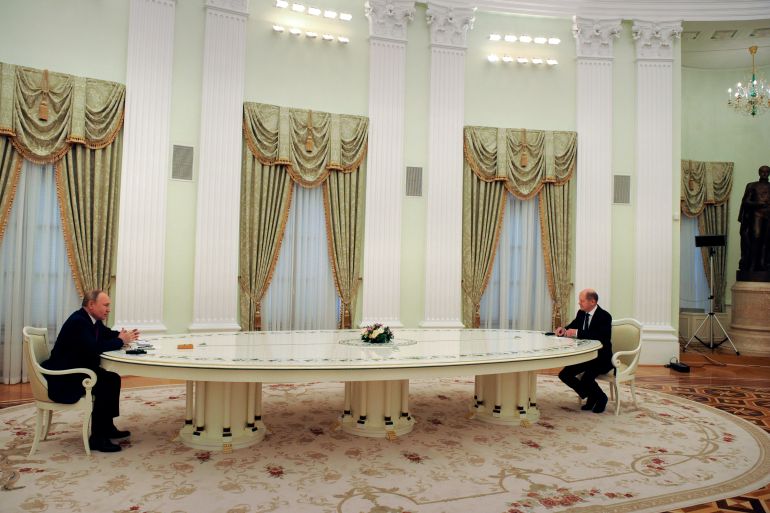Putin does not believe Ukraine invasion a ‘mistake’: Scholz
German Chancellor says no indication Putin has changed stance on Ukraine as UN chief says prospects for peace are ‘minimal’.

Vladimir Putin seems to believe he did not commit a mistake by launching an invasion of Ukraine, German Chancellor Olaf Scholz said on Wednesday after a 90-minute-long telephone call with the Russian president.
“Sadly, I cannot tell you that the impression has grown that it was a mistake to begin this war,” Scholz told journalists a day after his exchange with Putin.
Keep reading
list of 3 itemsRussia’s Putin to meet Indian PM Modi to boost trade ties
Chinese leader Xi Jinping in Kazakhstan before summit with Putin
“And there was no indication that new attitudes are emerging,” the German leader added at a joint news conference with his Georgian counterpart, Irakli Garibashvili.
In Tuesday’s call with the Russian leader, Scholz urged Putin to seek a diplomatic solution “based on a ceasefire, a complete withdrawal of Russian forces and respect for the territorial integrity and sovereignty of the Ukraine”.
The exit of Russian troops from Ukraine was the only way for “peace to have a chance in the region”, Scholz said on Wednesday.
Prospects for peace ‘minimal’
While Putin’s positions did not appear to have shifted, the German chancellor said it was necessary to remain in conversation with the Russian leader.
“It is right to speak with each other and to say what there is to say on this subject,” Scholz said.
In another phone call with Putin on Wednesday, UN Secretary-General Antonio Guterres said the two spoke about efforts to overcome “obstacles” that remain related to Russia’s food and fertiliser exports.
But prospects for peace in Ukraine are “minimal” at present, the United Nations chief lamented after the call, warning that it would be “naive” to believe there has been sufficient progress towards a rapid end to the war.
“I have the feeling we are still far away from peace. I would be lying if I would say it could happen soon,” Guterres told a news conference.
“I have no illusion; at the present moment the chances of a peace deal are minimal,” he added, noting that even a ceasefire is “not in sight”.
Despite his bleak assessment of the war that has raged since Russia invaded its neighbour in late February, Guterres stressed he was maintaining contact with both sides and expressed hope that “one day it will be possible to go to a higher level of discussion”.
In the meantime, talks continue about an exports deal “and its extension and its possible expansion”.
A two-part agreement — allowing both the flow of Ukraine’s grain exports blocked by the war and Russia’s food and fertiliser exports — was brokered by the UN and Turkey in July and is scheduled to last 120 days.
Guterres said there is discussion about the possibility of Russian ammonia exports through the Black Sea.
Ammonia, a key fertiliser ingredient, is produced by combining nitrogen from the air with hydrogen derived from natural gas.
Several European fertiliser manufacturers have stopped producing ammonia because of soaring gas prices.
Guterres warned the fertiliser crisis has reached a “dramatic” level, repeating his fears of a global food shortage next year.
He said he also spoke with Putin about prisoners of war and the state of Ukraine’s Zaporizhzhia nuclear power plant.